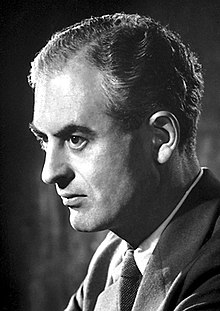Sir Peter Medawar | |
|---|---|
 Peter Medawar, 1960 | |
| Born | Peter Brian Medawar 28 February 1915 Petrópolis, Brazil |
| Died | 2 October 1987 (aged 72) London, England |
| Citizenship | British |
| Education | Magdalen College, Oxford (BA, DSc) |
| Known for | Immunological tolerance Organ transplantation |
| Spouse | |
| Relatives | Alex Garland (grandson) |
| Awards |
|
| Scientific career | |
| Institutions | |
| Thesis | Growth promoting and growth inhibiting factors in normal and abnormal development (1941) |
| Doctoral students | |
| Other notable students | Rupert E. Billingham (postdoc)[3] |
Sir Peter Brian Medawar OM CH CBE FRS (/ˈmɛdəwər/; 28 February 1915 – 2 October 1987)[1] was a British biologist and writer, whose works on graft rejection and the discovery of acquired immune tolerance have been fundamental to the medical practice of tissue and organ transplants. For his scientific works, he is regarded as the "father of transplantation".[4] He is remembered for his wit both in person and in popular writings. Richard Dawkins referred to him as "the wittiest of all scientific writers";[5] Stephen Jay Gould as "the cleverest man I have ever known".[6]
Medawar was the youngest child of a Lebanese father and a British mother, and was both a Brazilian and British citizen by birth. He studied at Marlborough College and Magdalen College, Oxford, and was professor of zoology at the University of Birmingham and University College London. Until he was partially disabled by a cerebral infarction, he was Director of the National Institute for Medical Research at Mill Hill. With his doctoral student Leslie Brent and postdoctoral fellow Rupert E. Billingham, he demonstrated the principle of acquired immunological tolerance (the phenomenon of unresponsiveness of the immune system to certain molecules), which was theoretically predicted by Sir Frank Macfarlane Burnet. This became the foundation of tissue and organ transplantation.[3] He and Burnet shared the 1960 Nobel Prize in Physiology or Medicine "for discovery of acquired immunological tolerance".[7]
- ^ a b Mitchison, N. A. (1990). "Peter Brian Medawar. 28 February 1915 – 2 October 1987". Biographical Memoirs of Fellows of the Royal Society. 35: 283–301. doi:10.1098/rsbm.1990.0013. PMID 11622280.
- ^ Anon (2016). "Peter Medawar EMBO profile". people.embo.org. Heidelberg: European Molecular Biology Organization.
- ^ a b c d Simpson, E. (2015). "Medawar's legacy to cellular immunology and clinical transplantation: a commentary on Billingham, Brent and Medawar (1956) 'Quantitative studies on tissue transplantation immunity. III. Actively acquired tolerance'". Philosophical Transactions of the Royal Society B: Biological Sciences. 370 (1666): 20140382 (online). doi:10.1098/rstb.2014.0382. PMC 4360130. PMID 25750245.
- ^ Starzl, T. E. (1995). "Peter Brian Medawar: father of transplantation". Journal of the American College of Surgeons. 180 (3): 332–36. PMC 2681237. PMID 7874344.
- ^ Dawkins, Richard, ed. (2008). The Oxford Book of Modern Science Writing. Oxford: Oxford University Press. p. 179. ISBN 978-0-19-921680-2.
- ^ Gould, Stephen Jay (2011). The Lying Stones of Marrakech: Penultimate Reflections in Natural History (1st Harvard University Press ed.). Cambridge, Mass.: Belknap Press of Harvard University Press. p. 305. ISBN 9780674061675.
- ^ "The Nobel Prize in Physiology or Medicine 1960". Nobelprize.org. Nobel Media AB. Retrieved 19 October 2015.